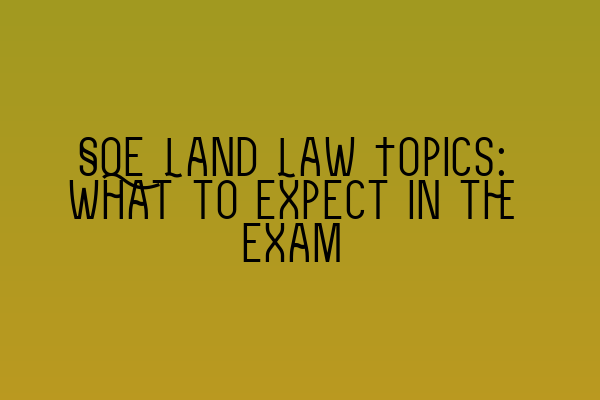SQE Land Law Topics: What to Expect in the Exam
As an aspiring property lawyer, it is crucial to have a comprehensive understanding of Land Law to excel in the Solicitors Qualifying Exam (SQE). This encompasses a wide range of topics, from property ownership to leasehold and freehold interests. In this blog post, we will discuss the key land law topics you can expect to encounter in the SQE exam, ensuring you are well-prepared and confident on exam day.
1. Property Ownership
Property ownership is a fundamental concept in land law. It involves understanding the different types of ownership, such as freehold and leasehold, as well as the rights and responsibilities that come with each. In the exam, you may be asked to identify the type of ownership based on a given scenario or explain the implications of specific ownership rights.
To deepen your understanding of property ownership, it is essential to explore the rights and responsibilities of parties in a contract. The article Parties in a Contract: Rights and Responsibilities delves into this topic, providing valuable insights that can enhance your Land Law knowledge.
2. Leases and Tenancies
Leases and tenancies form a significant part of the SQE Land Law exam. You should familiarize yourself with the essential concepts, such as the creation and termination of leases, the rights and obligations of landlords and tenants, and the remedies available for breaches of lease agreements.
In addition to Land Law, understanding contract law is crucial when dealing with leases and tenancies. To uncover the intricacies of contracts, including the role of duress and undue influence, make sure to read the article on Unveiling Duress and Undue Influence in Contracts.
3. Easements and Covenants
Easements and covenants are vital legal concepts in Land Law. An easement grants a person the right to use another person’s land for a specific purpose, while a covenant is a promise to do or not do something related to the land. Understanding the creation, enforcement, and discharge of easements and covenants is essential for the SQE exam.
4. Adverse Possession
Adverse possession refers to the acquisition of someone else’s land through continuous and uninterrupted possession for a specified period. It is a complex area of Land Law that requires a thorough understanding of the legal requirements and the process involved.
5. Registered and Unregistered Land
The concepts of registered and unregistered land are crucial in Land Law. Registered land refers to land that is recorded in the Land Registry, while unregistered land has not been officially recorded. Understanding the differences between the two and the implications for ownership and conveyancing is vital for success in the SQE exam.
Considering the significance of contracts in property transactions, deepening your knowledge of the essentials of consideration is recommended. The article on Essentials of Consideration: Understanding the Backbone of Contracts provides a comprehensive insight into this topic, enabling you to better understand the connection between Land Law and contract law.
6. Landlord and Tenant Law
Landlord and Tenant Law focuses on the legal relationship between landlords and tenants, covering aspects such as rental agreements, rent arrears, repairs, eviction, and leasehold enfranchisement. Understanding the rights and obligations of both parties is crucial in the SQE exam.
7. Mortgages and Secured Transactions
Mortgages and secured transactions involve the use of land as security for loans. You should have a solid understanding of the creation, priority, and enforcement of mortgages, as well as the rights and obligations of both borrowers and lenders.
8. Co-ownership
Co-ownership refers to the joint ownership of land by two or more individuals. Understanding the different types of co-ownership, such as joint tenancy and tenancy in common, as well as the rights and obligations of co-owners, is crucial for success in the SQE exam.
In addition to the topics discussed above, it is essential to have a good grasp of damages in contract law. The article on Damages in Contract Law: Assessing Financial Compensation explores the various aspects of damages, enabling you to better comprehend their relevance in Land Law.
Conclusion
Preparation is key when it comes to the SQE Land Law exam. By familiarizing yourself with the topics outlined above and integrating the related articles, such as the one on Express and Implied Terms in Contracts: Decoding Agreement Components, into your study, you will be well-equipped to tackle the challenging questions posed in the exam. Remember to review the specific exam syllabus and sample questions to further enhance your understanding and maximize your chances of success.
